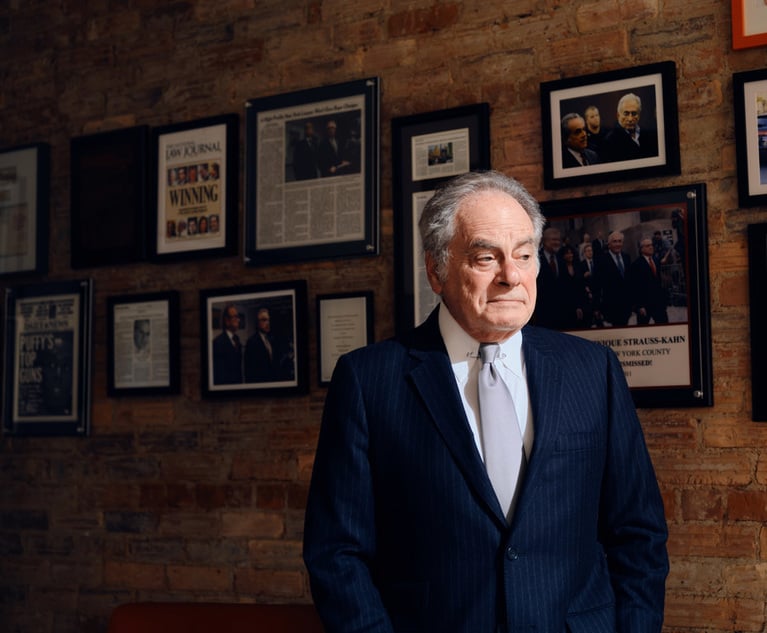Honeycutt v. United States
U.S. Sup. Ct.; 16–142 Terry Honeycutt managed sales and inventory for a Tennessee hardware store owned by his brother, Tony Honeycutt. After they…
June 05, 2017 at 07:07 PM
8 minute read
U.S. Sup. Ct.;
16–142
Terry Honeycutt managed sales and inventory for a Tennessee hardware store owned by his brother, Tony Honeycutt. After they were indicted for federal drug crimes including conspiracy to distribute a product used in methamphetamine production, the Government sought judgments against each brother in the amount of $269,751.98 pursuant to the Comprehensive Forfeiture Act of 1984, which mandates forfeiture of “any property constituting, or derived from, any proceeds the person obtained, directly or indirectly, as the result of” certain drug crimes, 21 U. S. C. §853(a)(1). Tony pleaded guilty and agreed to forfeit $200,000. Terry went to trial and was convicted. Despite conceding that Terry had no controlling interest in the store and did not stand to benefit personally from the sales of the product, the Government asked the District Court to hold him jointly and severally liable for the profits from the illegal sales and sought a judgment of $69,751.98, the outstanding conspiracy profits. The District Court declined to enter a forfeiture judgment against Terry, reasoning that he was a salaried employee who had not received any profits from the sales. The Sixth Circuit reversed, holding that the brothers, as co-conspirators, were jointly and severally liable for any conspiracy proceeds.
Held: Because forfeiture pursuant to §853(a)(1) is limited to property the defendant himself actually acquired as the result of the crime, that provision does not permit forfeiture with regard to Terry Honeycutt, who had no ownership interest in his brother's store and did not personally benefit from the illegal sales. Pp. 3–11.
This content has been archived. It is available through our partners, LexisNexis® and Bloomberg Law.
To view this content, please continue to their sites.
Not a Lexis Subscriber?
Subscribe Now
Not a Bloomberg Law Subscriber?
Subscribe Now
NOT FOR REPRINT
© 2024 ALM Global, LLC, All Rights Reserved. Request academic re-use from www.copyright.com. All other uses, submit a request to [email protected]. For more information visit Asset & Logo Licensing.
You Might Like
View All

Judge Asks: Should Tom Girardi Serve Sentence in a Medical Facility or Behind Bars?
4 minute read
Commentary: President Biden Should Commute Death Sentences of All Federal Inmates
6 minute read
Ben Brafman Reflects on Nearly 50 Years as a Defense Attorney
Trending Stories
- 1Call for Nominations: Elite Trial Lawyers 2025
- 2Senate Judiciary Dems Release Report on Supreme Court Ethics
- 3Senate Confirms Last 2 of Biden's California Judicial Nominees
- 4Morrison & Foerster Doles Out Year-End and Special Bonuses, Raises Base Compensation for Associates
- 5Tom Girardi to Surrender to Federal Authorities on Jan. 7
Who Got The Work
Michael G. Bongiorno, Andrew Scott Dulberg and Elizabeth E. Driscoll from Wilmer Cutler Pickering Hale and Dorr have stepped in to represent Symbotic Inc., an A.I.-enabled technology platform that focuses on increasing supply chain efficiency, and other defendants in a pending shareholder derivative lawsuit. The case, filed Oct. 2 in Massachusetts District Court by the Brown Law Firm on behalf of Stephen Austen, accuses certain officers and directors of misleading investors in regard to Symbotic's potential for margin growth by failing to disclose that the company was not equipped to timely deploy its systems or manage expenses through project delays. The case, assigned to U.S. District Judge Nathaniel M. Gorton, is 1:24-cv-12522, Austen v. Cohen et al.
Who Got The Work
Edmund Polubinski and Marie Killmond of Davis Polk & Wardwell have entered appearances for data platform software development company MongoDB and other defendants in a pending shareholder derivative lawsuit. The action, filed Oct. 7 in New York Southern District Court by the Brown Law Firm, accuses the company's directors and/or officers of falsely expressing confidence in the company’s restructuring of its sales incentive plan and downplaying the severity of decreases in its upfront commitments. The case is 1:24-cv-07594, Roy v. Ittycheria et al.
Who Got The Work
Amy O. Bruchs and Kurt F. Ellison of Michael Best & Friedrich have entered appearances for Epic Systems Corp. in a pending employment discrimination lawsuit. The suit was filed Sept. 7 in Wisconsin Western District Court by Levine Eisberner LLC and Siri & Glimstad on behalf of a project manager who claims that he was wrongfully terminated after applying for a religious exemption to the defendant's COVID-19 vaccine mandate. The case, assigned to U.S. Magistrate Judge Anita Marie Boor, is 3:24-cv-00630, Secker, Nathan v. Epic Systems Corporation.
Who Got The Work
David X. Sullivan, Thomas J. Finn and Gregory A. Hall from McCarter & English have entered appearances for Sunrun Installation Services in a pending civil rights lawsuit. The complaint was filed Sept. 4 in Connecticut District Court by attorney Robert M. Berke on behalf of former employee George Edward Steins, who was arrested and charged with employing an unregistered home improvement salesperson. The complaint alleges that had Sunrun informed the Connecticut Department of Consumer Protection that the plaintiff's employment had ended in 2017 and that he no longer held Sunrun's home improvement contractor license, he would not have been hit with charges, which were dismissed in May 2024. The case, assigned to U.S. District Judge Jeffrey A. Meyer, is 3:24-cv-01423, Steins v. Sunrun, Inc. et al.
Who Got The Work
Greenberg Traurig shareholder Joshua L. Raskin has entered an appearance for boohoo.com UK Ltd. in a pending patent infringement lawsuit. The suit, filed Sept. 3 in Texas Eastern District Court by Rozier Hardt McDonough on behalf of Alto Dynamics, asserts five patents related to an online shopping platform. The case, assigned to U.S. District Judge Rodney Gilstrap, is 2:24-cv-00719, Alto Dynamics, LLC v. boohoo.com UK Limited.
Featured Firms
Law Offices of Gary Martin Hays & Associates, P.C.
(470) 294-1674
Law Offices of Mark E. Salomone
(857) 444-6468
Smith & Hassler
(713) 739-1250






